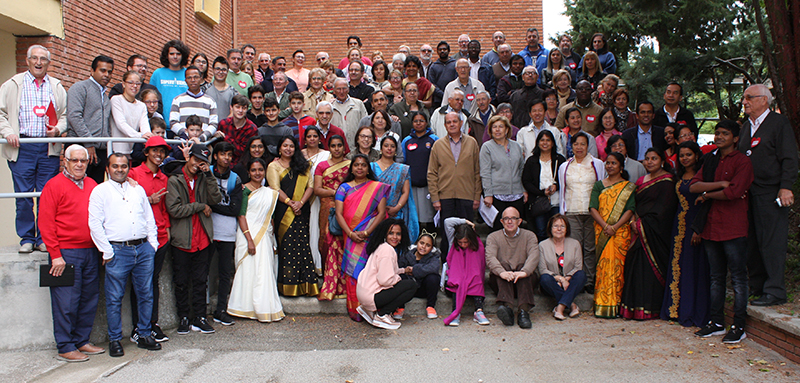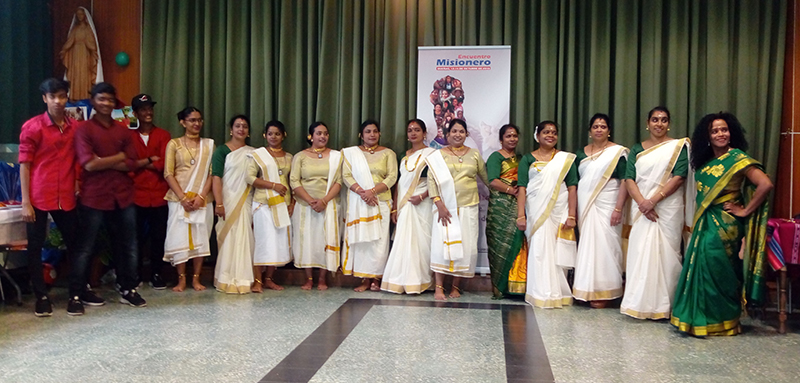If Mary of Magdala were to return today, what would she say? Would we accept our missionary discipleship with the promptness and love that she showed her beloved Master? Who was Mary Magdalene really? We attempted to answer these and other questions during the XI Missionary Meeting held in Dueñas (Palencia-Spain) from 12th to 14th October, 2018. To this end, 120 people - lay and religious - from Palencia, Ponferrada, Valladolid, Zamora, Navarra, Alcorcón, Móstoles, Madrid, Mérida and Cádiz gathered together.
This year the motto was "And the Word became flesh ... and has the face of a woman". In the light of the Gospel of John 20, 1-18, the whole meeting revolved around how Jesus breaks with patterns, allowing himself to be found by a woman, entrusting to her the mission of announcing the Good News of the Resurrection to the disciples. Not to Peter, not to John ... the beloved disciple, but to her, Mary Magdalene.
We begun by making a historical, geographical and social approach to her figure, demolishing false myths about her status as a prostitute (which the Bible never mentions) and on the contrary we discovered a woman with sins and weaknesses to be forgiven (like all of us) but free and rich, who left everything for the love of her Rabbi and became a witness and leader of her community. Then we analyzed, working in groups, our own spiritual journey of encounter with Jesus, allowing ourselves be soaked by the Word to understand our own lights or darkness in the path of maturity of our faith. We sprinkled the various moments with prayers, images, poems and evocative songs, allusive to the theme, trying to see the feminine face of God.
We had time to analyze the role of women in the Church, historically and nowadays, and the commitment to ensure that this role - minimized and rendered unimportant by a patriarchal system since time immemorial - has the transcendence and dignity that Jesus gave it, putting women in the place that corresponds to them and to which they have a right.
For this reason, an important part of the program was the presentation of the missionary project that Fr. Janssen Madanu SVD, an Indian missionary who is currently the parish priest of Virgen del Alba (Virgin of the Dawn Parish) in Alcorcón, offered us, the participants. A journey through the reality of women in the tribes of India - specifically in Rourkela - where Rev. Sr Sumita Kujur imparts education and training to women and girls: sewing and clothing courses, talks on skills in public speaking, meetings where they are instructed on their rights as the fundamental support of families and society. These talks are also now imparted to men and young people to educate them in gender equality. This project organises meetings where it manages to summon up to 1200 women, because despite the extreme poverty in which they live, their faith is very great, going immense distances on foot to attend the Eucharist and other celebrations.
Our commitment to this project is not only economic (which requires our effort to finance the activities carried out in the area and thus provide long-term continuity; to this end, we established a symbolic participation fee for the meeting, we set up a market of handcrafted fans and also CDs of Castilian folk music - thanks to the donations of the participating lay people - and we placed a small urn for those who would like to collaborate with this important project) but also involves efforts to change the status quo, raising awareness and denouncing inequality, injustice and poverty that almost always hit women.
As a finishing touch, in addition to the evening party on Saturday night (with drawing contests, singing duels and lots of laughs) we were able to enjoy a show of typical dances from South India, performed by Indian dancers who, dressed in brightly coloured costumes, delighted the audience with their movements and their music.
As we wanted the whole meeting to have an "Indian flavour", the Eucharist we celebrated on Sunday - presided by Fr. Janssen - began with a typical Indian ritual of flowers, incense, light and music. The women, as it obviously couldn't be otherwise, had a preponderant place on the altar: in the reading of the Gospel and in the singing of the Lord's Prayer in Tagalog by Filipino women. We topped off with a community meal (paella), ending this weekend with a good taste in the mouth.
We were able to "know and recognize ourselves" in the face of the Master who calls us by our name, to come out with more strength to proclaim the Gospel. He knows our moments of darkness: may his Grace illuminate our journey of seeing-believing-announcing, removing our bandages to glimpse all the occasions of encounter that allow us to discover in the other, be it a man or a woman, the face of the Risen Jesus.
By: Laura Díaz Bilbao, LVD










